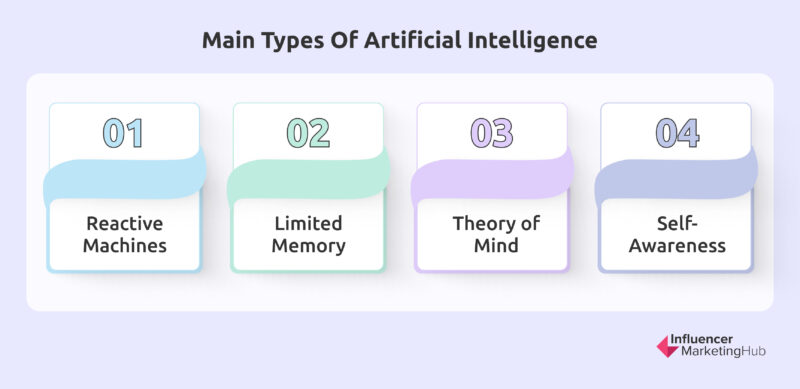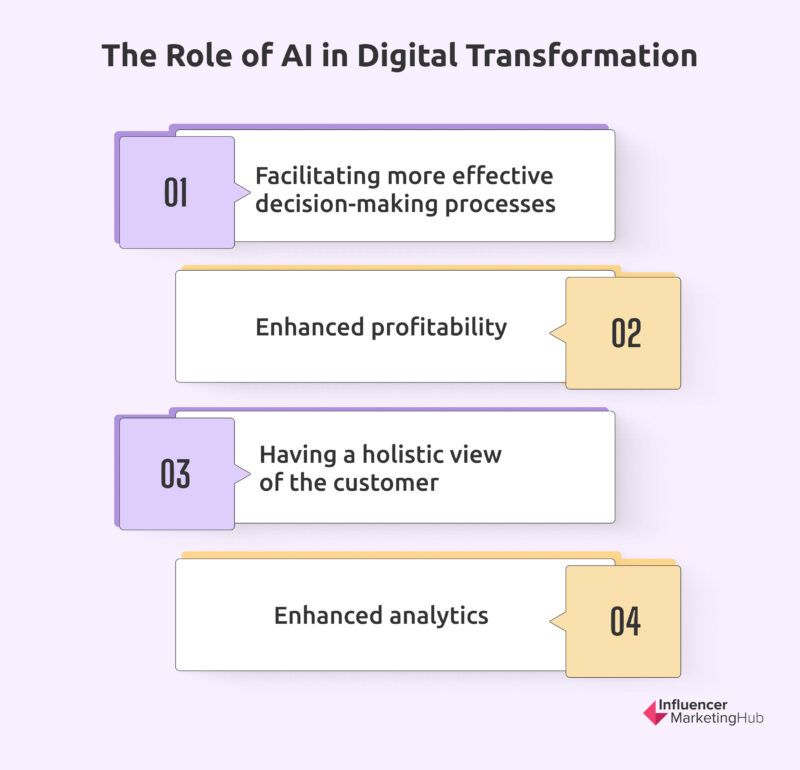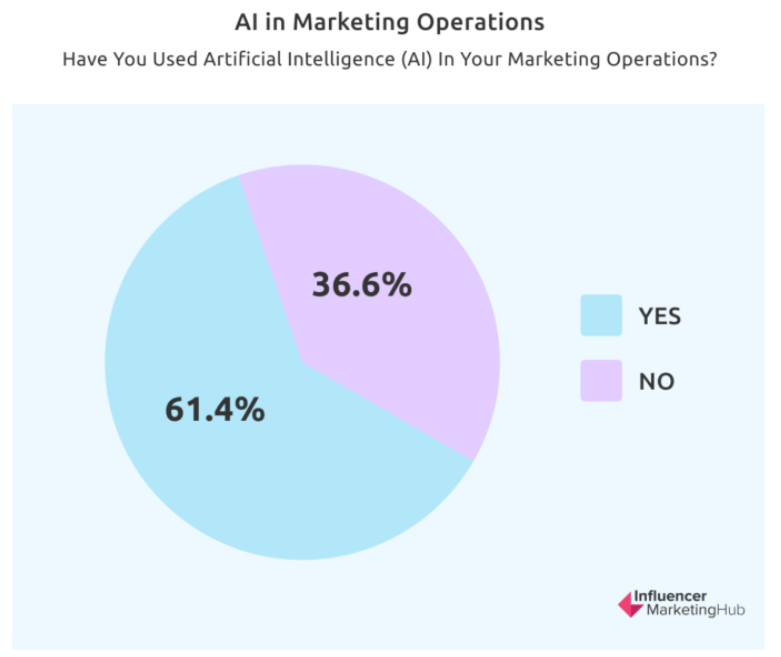Nowadays, it’s getting easier to find AI tools with various use cases across industries.
In business, AI tools are widely used for automation, operations, and customer support. These tools are also essential for analyzing, integrating, and visualizing data. In marketing, AI has become a critical component of a brand’s strategy. AI tools enable email marketers to generate content more quickly and enhance the effectiveness of their campaigns. In fact, more than half (53.8%) of companies plan to implement AI and machine learning tools in the next 2-3 years, highlighting the growing reliance on these technologies.
Other sectors, such as healthcare, telecom, retail, and education, are also seeing significant benefits from AI adoption.
One of the major drivers of AI's rapid growth is the increasing accessibility of these technologies, thanks to advancements by tech companies. As AI becomes more integrated into various industries, it plays a pivotal role in driving digital transformation initiatives. The implications of using AI for digital transformation are vast, offering new opportunities for efficiency, innovation, and customer engagement.
What is Artificial Intelligence?
Artificial intelligence (AI) refers to a branch of computer science that builds machines or systems that are capable of simulating how the human brain works. For instance, an AI system can automate routine tasks, solve problems, and learn from previous experiences. One common and very limiting view of AI and what the technology can do is that it’s just about creating intelligent machines or systems. However, AI is much more complex than that. Several components in AI systems include machine learning, deep learning, and natural language processing (NLP). AI systems take a vast amount of training data and analyze them by looking for correlations or patterns, which it will then use to make predictions. AI needs to be “trained” for it to be able to generate better, more accurate, and more lifelike responses or to generate actionable information.
There are four main categories of AI, which are categorized based on their type and the complexity of the tasks they can perform. . These are:

1. Reactive Machines
Reactive machines are capable of performing limited tasks. It operates on a primary level and thus is only able to perceive and act upon certain stimuli. It’s not capable of predicting future actions. One example of a reactive machine is the IBM Deep Blue, which was an IBM computer that beat the Russian chess grandmaster Garry Kasparov in 1997.
Despite having a limited scope, reactive machines can still be developed to become more complex and come in handy when completing repetitive tasks.
2. Limited Memory
Limited memory AI can store previous data and predictions to identify potential future outcomes. This type of AI is continuously trained to analyze and utilize new datasets.
3. Theory of Mind
Theory of mind AI is considered the “next level” of artificial intelligence. The theory of mind AI should be capable of understanding how the mind works, including emotions and behavior, and use that to make their own decisions.
4. Self-Awareness
Self-awareness AI, otherwise called sentient AI is the “last step” in AI development, which hasn't yet occurred. Once an AI system has established a theory of mind, it can contribute to making AI self-aware and thus achieve a level of consciousness that’s on the same level as humans.
Real-World Use Cases of AI Technology
AI is a vital tool that allows businesses to gain operational insights, which can help them streamline workflows and optimize processes.
Aside from uncovering insights, AI can have other real-world applications. Below are just a few examples of how AI is being used in the real world:

1. Speech Recognition
Speech recognition is an integral part of many AI applications. Through speech recognition in AI, computers or applications can “understand” human speech, turning it into the text to facilitate voice searches or to process information more accurately.
2. Recommendations
Using AI algorithms to analyze data trends and consumer behavior data can allow businesses to develop enhanced strategies. These can then be used to offer more relevant or useful recommendations for their customers.
3. Customer Service
One of the most common examples of how AI is transforming the field of customer service is chatbots or virtual agents. These AI-powered tools enable customers to answer questions quickly, offer personalized recommendations and answer a customer’s frequently asked questions (FAQs) without necessarily needing human intervention.

Source: nordstrom.com
4. Healthcare
AI technology is already being extensively used in the healthcare industry. For instance, they use AI predictive analytics to help healthcare professionals identify whether or not a patient needs surgery, therefore mitigating any potential risks and taking avoidable surgeries out of the equation. Aside from predictive analytics, AI’s machine learning capabilities can help medical experts diagnose and take proactive measures against infectious diseases. Moreover, AI in healthcare apps can help patients monitor their daily care, such as giving them alerts for medications, thus allowing them to become more proactive when it comes to their health.
5. Manufacturing
AI is also proving to be an indispensable tool in the manufacturing industry. For example, inventory management systems may integrate artificial intelligence to streamline processes and reduce human error. AI’s advanced data analytics can also benefit companies aiming to achieve digital transformation by helping them mitigate risks, visualize data, and make better decisions faster.
How AI Is Driving Digital Transformation Initiatives
Digital transformation (DX) refers to the process of how companies incorporate different technologies to promote changes or transform existing business processes, cultures, and experiences. Through digital transformation, businesses can better meet changing market and consumer demands, as well as become more efficient and agile.
Automation vs. AI
Automation and AI are sometimes used interchangeably because, at first glance, they seem similar. However, they’re two different things. Before we dive deeper into how AI facilitates digital transformation initiatives, it’s vital that we first determine the differences between automation and AI.
Automation refers to a system that can run by itself with little to no human intervention. It works by following a set of patterns or rules and is widely used in fulfilling routine tasks. While automation does use traditional software, it’s possible to take its capabilities to the next level by incorporating AI branches like machine learning and deep learning (AI automation).
Meanwhile, artificial intelligence refers to a technology capable of simulating how humans think. It uses data to recognize and learn patterns and use what it has learned to make predictions or actionable decisions. AI is capable of learning from datasets since it involves a system learning from data and evolving, unlike pure automation (without AI). It also “learns” from human interactions and can be “trained” using datasets.
AI-Powered Digital Transformation
There’s no one-size-fits-all formula when it comes to achieving digital transformation. It is important to keep in mind that customer expectations are the primary driver of DX. Aside from being able to conduct business digitally, today’s consumers expect that businesses will be able to provide them with omnichannel experiences.
For example, one company might use AI to create enhanced experiences for their customers, while others leverage newer technologies to bolster its supply chain management. Furthermore, some companies may opt to use AI to enhance or complement IT activities, such as bolstering cybersecurity measures and addressing their users’ tech problems, while others might use AI to create bespoke marketing campaigns and promotions.
Without digital transformation, it can be difficult for businesses to keep up with the changing market requirements and consumer expectations. By embracing digital technologies, such as AI, businesses are better able to create experiences for their customers, deliver more value, and transform the way they operate.
The Benefits of AI in Digital Transformation
Artificial intelligence is an integral component that drives digital transformation. By leveraging AI-powered processes, for example, companies can react to unexpected changes or emerging trends faster and more effectively. AI algorithms can learn from previous experiences and datasets and can, therefore, analyze potential outcomes and even mitigate future risks.

Some of the other benefits of using AI to facilitate digital transformation initiatives include:
-
Facilitating more effective decision-making processes
AI helps optimize business processes while mitigating any potential risks. This allows managers to have access to critical information, which, in turn, lets them make more effective decisions faster. For instance, when you incorporate an AI solution into your operations, it can process and analyze large volumes of data. With sufficient training, your AI solution can “learn” from these interactions and examples, allowing it to make more accurate suggestions or predictions.
-
Enhanced profitability
By incorporating AI solutions into your business processes and workflows, you can minimize risks and increase operational efficiency more effectively. This, in turn, can help accelerate your organization’s growth. When it comes to profitability, an AI solution can help you optimize different marketing channels, run tests, and scale marketing campaigns.
-
Having a holistic view of the customer
One of the key benefits of using AI to facilitate DX initiatives is it allows you to have a 360-degree view of your customers. AI is capable of taking in a large amount of data and analyzing it to uncover emerging trends and changes in consumer behavior. By giving you actionable insights, AI can help you create tailored campaigns, craft hyper-targeted messaging or ads, and deliver smoother customer experiences across different channels.
-
Enhanced analytics
Data is essential to any digital transformation strategy, and AI solutions can help you collect and capitalize on the data you’ve gathered. AI is capable of processing thousands, if not millions, of data points to uncover insights and trends in real-time. With this, you can make data-driven decisions and be better able to anticipate your customers’ needs.
When companies use AI to drive DX initiatives, they can become more innovative, flexible, and agile. That’s because AI helps them simplify complex processes, streamline business processes to enhance productivity, use data to improve current offerings, and craft improved business strategies.
AI Marketing in 2024
AI marketing is a growing marketing subset.
In AI marketing, artificial intelligence components, such as advanced machine learning, are used to streamline and automate marketing processes (intelligent automation). Additionally, AI is increasingly being used in marketing to deliver highly personalized content to customers, automate repetitive or time-consuming tasks, leverages customer data to gain deeper insight into customer behavior, reduce labor costs, and allow marketers to respond quickly to emerging trends and changing market landscapes.
A survey by the Influencer Marketing Hub shows that 61.4% of marketers are using AI in their marketing operations. Moreover, more than half of the respondents (54.5%) are optimistic that AI can help them improve their marketing efforts.

AI and AI-powered tools are being widely used in marketing for content creation, ad targeting, predictive analytics, and marketing automation.
Key AI Marketing Trends
AI marketing is set to undergo significant transformations in 2024, driven by advances in technology and changing consumer behaviors. One notable trend is enhanced ad targeting, where AI will further refine the precision of marketing messages by analyzing vast datasets. This will push marketers to focus on the quality and relevance of their campaigns as consumers become increasingly selective about the ads they engage with.
Another major development is in advanced marketing automation, which will see AI-powered tools enabling more personalized and timely campaigns, particularly through the rise of micro-campaigns and hyper-personalized content.
Additionally, voice search and shopping will gain prominence, requiring marketers to adapt their strategies to optimize for voice-activated technologies. This shift includes creating content that aligns with conversational queries and enhancing the voice shopping experience. The integration of multimodal AI, which combines text, images, and other data types, will empower brands to produce richer content experiences, offering smaller companies a competitive edge against larger teams.
As these trends unfold, marketers will need to stay informed and adapt their strategies to leverage AI effectively, ensuring they remain competitive in an increasingly digital landscape.
AI and Influencer Marketing
AI is already making waves in influencer marketing.
Influencer marketing challenges are being solved with it, such as how to prevent influencer fraud, analyze target audiences, and match influencer content to the right influencer, among other applications.
Aside from being used to address these challenges, AI is also used to transform the influencer marketing industry. For instance, businesses are using AI to implement contract terms, improve compliance with FTC regulations, predict influencer performance, and run simultaneous influencer campaigns.
Businesses are also using AI to work with virtual influencers, which are digital avatars created by computers and managed by humans. These lifelike digital avatars go on to build a following and “work” with brands. Some of today’s most popular virtual influencers include Lu do Magalu, Lil Miquela, and Imma.
@lilmiquela
Achieving Digital Transformation with AI
AI is increasingly penetrating our daily lives, from helping users generate content and detecting fraud to automating business processes and analyzing large amounts of data. While it’s no longer just the stuff of science fiction, there’s no denying that AI technology still has a long way to go.
As it is now, AI is already being used to drive digital transformation. Aside from enhancing productivity and efficiency in the workplace, as well as reducing human error and redundancy, AI equips businesses with the capacity to create better digital transformation strategies. That’s because AI allows them to have a 360-degree view of their customers, therefore allowing businesses to have a better understanding of their audience and uncover consumer insights faster. This, in turn, helps businesses create strategies optimized to nurture customer loyalty, offer more value, and create more effective campaigns.
Moreover, AI helps businesses mitigate risks, enabling them to grow faster and be better able to facilitate innovation and creativity.
AI does have a lot of benefits in store for businesses. However, it’s worth noting that it still has some drawbacks. For instance, while AI tools and systems are easily accessible, learning how to use them might entail a bit of a learning curve. Also, if you’re planning on building your own AI system or application, you’ll need to have qualified workers who have the necessary technical skills onboard.
Frequently Asked Questions
What role does AI play in digital transformation in 2024?
AI is central to digital transformation in 2024, enabling businesses to automate processes, enhance decision-making through data analysis, and create hyper-personalized customer experiences. It drives efficiency and innovation across various industries, fundamentally changing how companies operate and engage with customers.
What are some of the common AI tools being used today?
Some of the most common AI tools being used today include:
- Content Marketing: Jasper.ai, GPT-3, and Lyrebird help create and optimize content.
- Email Marketing: Tools like Omnisend, EmailOctopus, and ActiveCampaign automate and personalize email campaigns.
- Social Media Marketing: Brandwatch, Hootsuite, and HubSpot are popular for managing and analyzing social media activities.
- Predictive Analytics: CognitiveScale, Alteryx, and Qlik are widely used for data-driven insights and predictions.
Is AI important in creating a successful digital transformation strategy?
Yes. AI is a vital component in creating a successful digital transformation strategy. That’s because AI enables businesses to have a holistic view of their customers. Furthermore, AI is also capable of transforming operational processes, making them faster and more effective. AI also facilitates dynamic analytics, allowing companies to leverage the data they collected to provide customers with enhanced experiences.
What industries are most affected by AI-driven digital transformation?
AI is transforming a wide range of industries, including healthcare, finance, retail, and manufacturing. In healthcare, AI predicts patient outcomes and personalizes treatments; in finance, it enhances fraud detection and customer service; and in manufacturing, it enables predictive maintenance and quality control, illustrating AI's broad impact across sectors.


